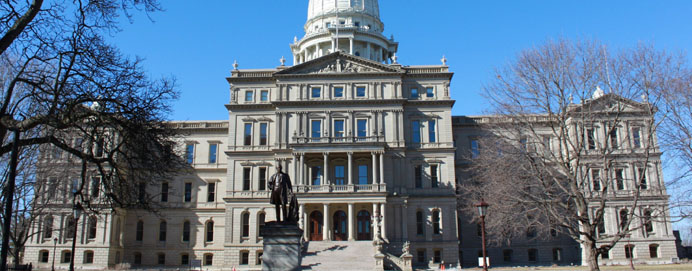Contact Us
(810) 275-0420Phone
10801 S. Saginaw St, Suite G
Grand Blanc, MI 48439
Bankruptcy - Debtor Representation
Chapter 7 - This is the most common form of bankruptcy for individuals. Chapter 7 is generally known as "liquidation" because the bankruptcy Trustee has the authority to liquidate (sell) your assets to pay your obligations. However, in my experience, the majority of chapter 7 debtors end up retaining most if not all of their assets. All individual Chapter 7 debtors have a list of exemptions that they may apply to specific assets. An exemption allows you to protect an asset up to the maximum value of the exemption. Many if not most debtors have more exemptions available than value in assets.
Once you have submitted the bankruptcy petition and schedules, you are scheduled to meet with the Chapter 7 Trustee, typically within 30-45 fays from the filing. This is what is known as the 341 meeting or "meeting of creditors." At that meeting, the Trustee and any creditors who appear can ask you about the information contained in your petition and schedules as well as any other information that may be relevant to the proceedings. If the Trustee is satisfied that you have provided complete and truthful information, your meeting of creditors will be concluded at that time. If the Trustee is not satisfied, he or she may continue the meeting in order to obtain more information or testimony from the debtor(s). In the majority of cases, once the Chapter 7 Trustee concludes the meeting to creditors, the active participation by the Trustee is complete.
Assuming there are no bumps along the road, a debtor will get a discharge 60 days after the meeting of creditors. The discharge will relieve you of your obligation to pay various debts listed in the schedules. However, there are some debts for which the discharge generally will not apply such as student loan obligations, some types of unpaid taxes and child support obligations, among others. Make sure you discuss the dischargeability of your debts with your attorney.
Chapter 13 - There are times when a debtor may not qualify for a Chapter 7 proceeding or when a Chapter 13 proceeding provides benefits or protections that better fit the needs of the debtor. A Chapter 13 bankruptcy proceeding is different from Chapter 7 in various ways but the most significant is that the debtor must propose a payment plan to repay some or all of the outstanding obligations over time and the plan must be approved by the court. A formula based on income, expenses and assets determines the length of the Chapter 13 plan (36 to 60 months) and the amount of the monthly payment. At the end of the plan, assuming the debtor has complied with all requirements set forth in the plan and by the court, the debtor receives a discharge. Much like with a Chapter 7 proceeding, however, some debts are not dischargeable. Again, make sure to discuss this with your attorney.
Typically one would only prefer a Chapter 13 proceeding over a Chapter 7 proceeding for very specific reasons. Some of those reasons would include:
- The debtor does not qualify for Chapter 7 based on income levels
- The debtor has significant non-exempt assets
- The debtor recently received a Chapter 7 discharge and is not yet eligible to file again
- The debtor is being threatened with a foreclosure proceeding
Chapter 11 - Chapter 11 bankruptcy is generally reserved for distressed businesses although, under certain circumstances, it can be useful for individuals as well (those who have very large outstanding debts, for example). A Chapter 11 proceeding is similar to a Chapter 13 proceeding in that the debtor must propose a plan to repay some or all of its outstanding obligations. The debtor in a Chapter 11 proceeding, known as a "debtor in possession" because it retains possession of the assets of the business, generally continues to operate the business in much the same way as it had prior to the filing so long as the activities are in the ordinary and customary course of the business of the debtor without court approval.
In a Chapter 11 proceeding, creditors are usually much more active than in other forms of bankruptcy. Creditors will often demand restrictions on how much, if at all, the debtor may deplete assets during the operation of business in bankruptcy. Creditors will also require significant reporting requirements ensuring that they are aware of the ongoing financial status of the business.
The biggest drawback of a Chapter 11 proceeding is, without question, the cost. Chapter 11 proceedings are often complex and time consuming requiring the debtor to hire not only an attorney but accountants, consultants, real estate brokers and other professionals. In fact, because of the complexity of Chapter 11 proceedings, many bankruptcy attorneys choose not represent Chapter 11 debtors.
My experience in bankruptcy runs the spectrum from representing the smallest of Chapter 7 debtors to multi-million dollar corporations in Chapter 11 proceedings and virtually everything in between. I've prepared petitions and schedules that include a handful of creditors and those that include more than a thousand creditors. I invite you to contact the Law Offices of Maynard F. Newman, PLLC at (810) 584-7068 to discuss your situation and the available options.
The Law Offices of Maynard F. Newman, PLLC is a debt relief agency. We help people file for relief under the Bankruptcy Code.
Maynard Newman represents clients in Michigan ranging from large corporate entities to single individuals and everything in between, specializing in Bankruptcy, Corporate Representation and Estate Planning.
